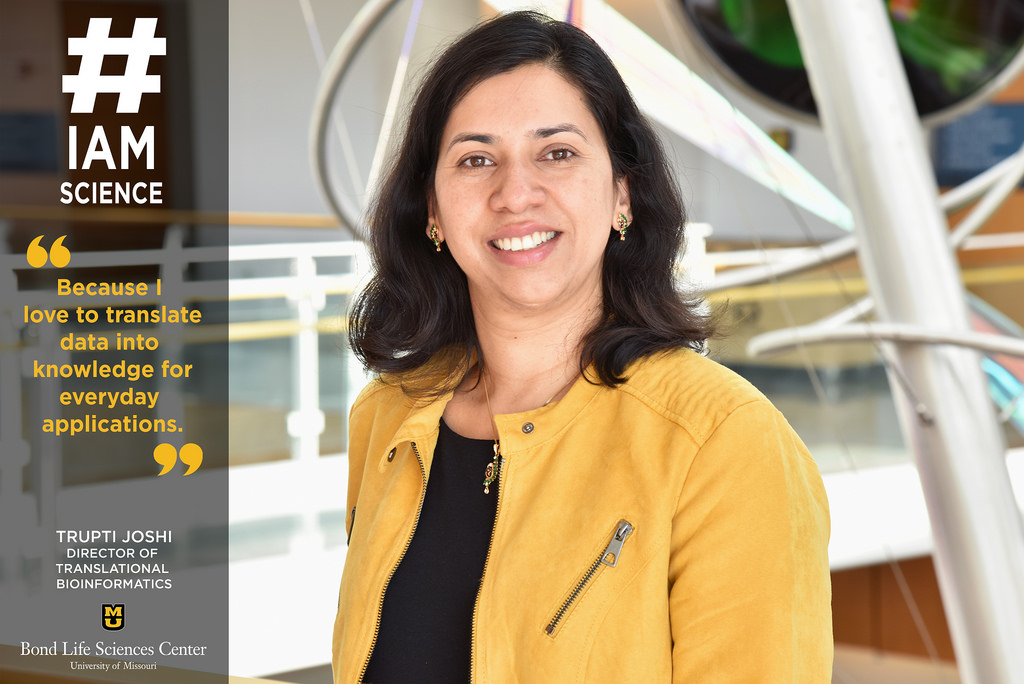Published on
By Erica Overfelt | Bond LSC
Juggling research, teaching, collaborative meetings, grant writing, and training postdocs and students is no problem for Trupti Joshi.
That array of responsibilities is just part of the job for a Bond LSC researcher focused on bioinformatics, an area that connects so many types of science by collecting and analyzing genetic data.
“Bioinformatics is a very interdisciplinary science that marries the wet and the dry labs,” Joshi said. “It applies software tools and computational techniques from computer science, engineering, mathematics and statistics towards efficient ways to analyze, integrate and mine large-scale genomics and multiomics datasets from biological, plant and biomedical sciences. This research aids in the use of genomics in all areas of life and science from food and crop production decisions based on climates to healthy lifestyle and drug development for treatments.”
Dealing with genetic data might seem dry, but Joshi said the tools it uses answers questions that touch many areas of our world.
“Every aspect in everyone’s life touches genomics,” Joshi said. “What we do in genomic studies is important because it can be really important for the common man. Where did the roses get their fragrance or their beautiful petals? How did this emerge? Or at the same time why does the fruit taste bitter or sour? It comes down to that genomic blueprint.”
While you can often catch Joshi doing research at one of her labs in Bond LSC and School of Medicine, her area is applicable to almost every corner of campus. That’s reflected in her many positions and titles across MU. She’s director of translational bioinformatics and assistant professor in the Department of Health Management and Informatics, has appointments as core faculty with the Informatics Institute, the Interdisciplinary Plant Group, the Department of Computer Science and a primary investigator at Bond LSC.
Though Joshi trained as a clinical doctor prior to her doctoral degree, she believes she was destined to become involved with bioinformatics. While she loves to draw and thought about architecture, her family’s trajectory always influenced her toward science. With her father being an engineer, her mother a mathematician, one sister a doctor and the other a computer science engineer, bioinformatics field gave a chance to marry all of these fields into one and be able to do a bit of everything.
“My sisters and my parents motivated me, instilled the liking for science and overall higher education have been the pillar of what our parents have stressed in our family,” Joshi said. “It comes to your thinking and carving your career path. My sisters’ careers provided me an opportunity to see both clinical and engineering fields really closely, and that inspired me to pick the unconventional path because I could see a bit of both in me.”
Joshi hopes she influences others in their career paths.
“What I feel is important for my graduate students and post docs is encouraging them to define their skills,” Joshi said. “Some may be teaching or being a faculty or setting up their own industry. I think that really ends up being the force behind you and makes your life and career interesting.”
And the constant interaction with collaborator has kept her eager to get to the lab each morning and making discoveries for 18 years.
“What I feel is important in a career is that you are really interested and passionate about your work,” Joshi said. “It is the driving force to starting your day. If the questions you are working on are uninteresting it affects your life. I like to be ambitious and set the bar high, so one can break one’s own records.”
